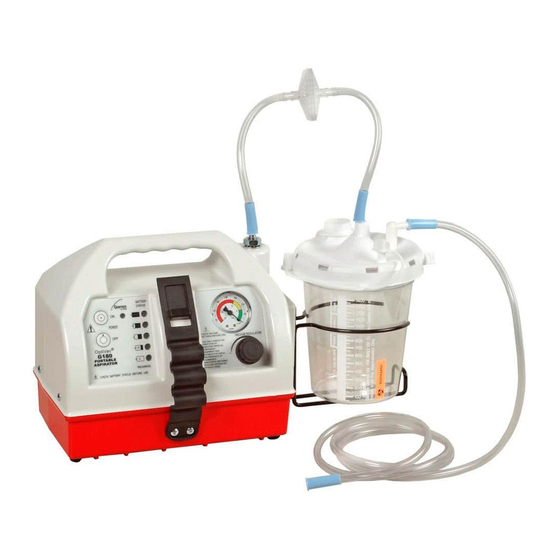Allied Healthcare G180 Operation & Service Manual - Page 5
Browse online or download pdf Operation & Service Manual for Medical Equipment Allied Healthcare G180. Allied Healthcare G180 14 pages. Dc portable aspirator

a.
Pinch off the patient tube. The amount of vacuum, in millimeters of mercury (mm Hg), will register on the
vacuum gauge.
b.
Increase the vacuum by turning the regulating knob clockwise. To decrease the vacuum, turn the knob
counter-clockwise.
c.
Release the pinched tubing.
3.4 For the L190 unit, press the "Hi vacuum" switch to select the high vacuum level. Press the "Lo vacuum "
switch to select the low vacuum level.
3.5 The battery will recharge, from a condition of low charge, within 8 hours maximum, using either the external
12 Volt DC or 115 or 230 Volt AC power supplies when the unit is idle. When battery is fully charged,
charging is automatically stopped and battery is maintained at full charge if charger is connected.
3.6 When the unit is on, is being charged, or testing battery status (pushing "off" button), the LED's indicate the
state of the battery as follows:
Five green LED's indicate a fully charged battery condition.
Four/three green LED's indicate a normal battery condition, but not fully charged.
Two red LED's indicate a drained battery condition with limited run time.
One red LED indicates a drained battery condition, unit will shut down soon.
Five red LED's, during charging only, indicate the battery needs to be replaced.
The battery should be recharged every two weeks even if it hasn't been used. To store the aspirator for
*
periods of time longer than one month, the battery connection fuse (sec. 2.3) should be removed.
For optimum battery performance the unit may be left plugged in at all times. The unit will turn
the charging circuit "On & Off" to keep the battery at a full charge level.
3.7
The collection container must be empted or replaced when it get full or when the shut off activates.
4.0 MAINTENANCE AND SERVICE
WARNING:
4.1 PUMP LUBRICATION:
The pump and motor are permanently lubricated and require no oiling or greasing.
CAUTION:
4.2 BACTERIA FILTER
The Bacteria Filter should be replaced after one month of patient use or when a reduction of air flow is noticed.
With the vacuum regulator fully closed and the tubing disconnected from the "Fluid Side" of the filter (filter
open to atmosphere), a vacuum reading in excess of 50 mm Hg on the gauge indicates the filter should be
replaced. It must be replaced in the event fluids have been in contact with the filter, such as in a collection
bottle overflow.
NOTE: Extended use of alcohol or solvents may reduce the hydrophobic properties of the microporous
membrane.
WARNING:
4.3 TUBING:
The tubing must be changed after each patient.
4.4 BACTERIA FILTER, TUBING & COLLECTION BOTTLE DISPOSAL:
Dispose of in accordance with state and local codes for biohazard materials.
Electric shock hazard. Refer servicing to qualified service personnel.
Do not use pump if contaminated with liquids or solids.
Do not at any time lubricate any of the parts with oil, grease or petroleum products.
Treat the bacteria filter, tubing & drainage fluids as biohazard materials
*
5
